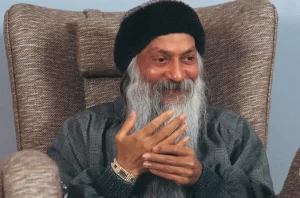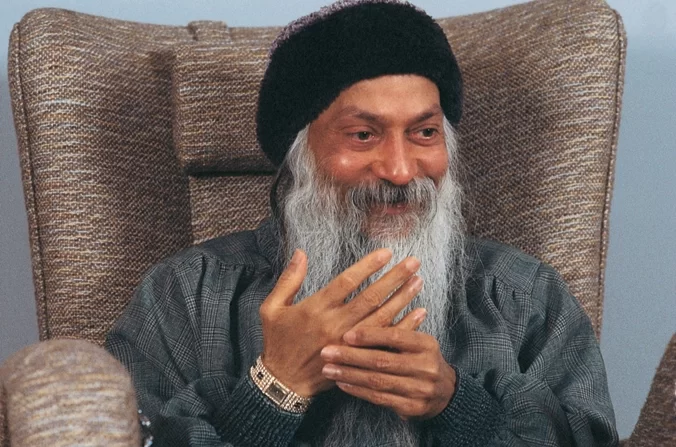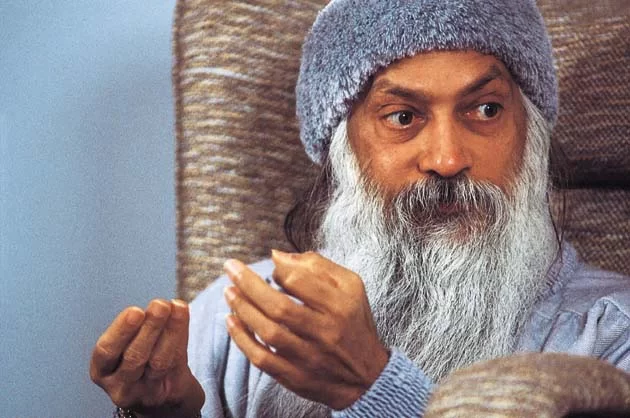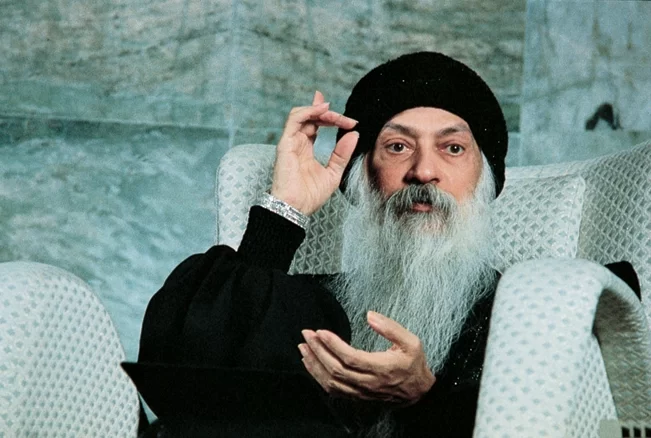Osho on Enlightened Zen Master Gutei
Gutei Isshi was a 9th-century Chinese Chan or Zen, master who spent his time alone in the mountains, meditating and chanting the Kannongyō, the twenty-fifth chapter of the Lotus Sutra. One day, he was visited by a young nun who lived nearby. The nun challenged Gutei to utter a word of Zen, but—when he proved unable to do so—she left. Having spent so much time in meditation and study, Gutei became dismayed at his inability to say a single word of Zen to the nun. Shortly afterwards, Tenryū paid Gutei a visit. Gutei realized that his inability to answer the nun was due to his lack of understanding, and asked Tenryū to teach him. Tenryū held up his finger, and at that moment Gutei was enlightened.
The other more famous version is – Gutei raised his finger whenever he was asked a question about Zen. A boy attendant began to imitate him in this way. When anyone asked the boy what his master had preached about, the boy would raise his finger. Gutei heard about the boy’s mischief. He seized him and cut off his finger. The boy cried and ran away. Gutei called and stopped him. When the boy turned his head to Gutei, Gutei raised up his own finger. In that instant the boy was enlightened. When Gutei was about to pass from this world he gathered his monks around him. “I attained my finger-Zen,” he said, “from my teacher Tenryū, and in my whole life I could not exhaust it.” Then he passed away.
Osho talks about Gueti and an instance of him raising his finger which was not there, and says, “GUTEI WAS HOLDING UP HIS OWN FINGER. THE BOY WENT TO HOLD UP HIS FINGER, AND WHEN HE REALIZED IT WAS NOT THERE, HE BOWED. IN THAT INSTANT, HE BECAME ENLIGHTENED.
GUTEI WAS HOLDING UP HIS OWN FINGER — a very intense moment of awareness, a very great device, a situation created by the master. Mind is no longer there, the pain has disappeared, because attention has been called somewhere else… as if the boy will not be able to breathe in this situation. “Stop!” — and the breathing has stopped, and the thinking has stopped, and he has forgotten that he has no finger now. Just out of old habit, when the master raised his finger, he raised his — which was not there. It shows that he has completely forgotten what has happened. In that moment he was not the body, otherwise how can you forget? — the pain, and your finger has been cut off, and you are bleeding, and your eyes are still filled with tears, and just a moment before he was howling. This “Stop!” caused a miracle.”
Osho says….
THE ZEN MASTER GUTEI MADE A PRACTICE OF RAISING HIS FINGER WHENEVER HE EXPLAINED A QUESTION ABOUT ZEN. A VERY YOUNG DISCIPLE BEGAN TO IMITATE HIM, AND WHENEVER ANYONE ASKED THE DISCIPLE WHAT HIS MASTER HAD BEEN PREACHING ABOUT, THE BOY WOULD RAISE HIS FINGER. GUTEI GOT TO HEAR ABOUT THIS, AND WHEN HE CAME UPON THE BOY AS HE WAS DOING IT ONE DAY, HE SEIZED THE BOY, WHIPPED OUT A KNIFE, CUT OFF HIS FINGER, AND THREW IT AWAY. AS THE BOY RAN OFF HOWLING GUTEI SHOUTED, “STOP!” THE BOY STOPPED, TURNED ROUND, AND LOOKED AT HIS MASTER THROUGH HIS TEARS. GUTEI WAS HOLDING UP HIS OWN FINGER. THE BOY WENT TO HOLD UP HIS FINGER, AND WHEN HE REALIZED IT WASN’T THERE HE BOWED.
IN THAT INSTANT HE BECAME ENLIGHTENED.
This is a very strange story, and there is every possibility that you will misunderstand it, because the most difficult thing to understand in life is the behaviour of an enlightened person. You have your own values, and you always look through those values.
An enlightened person is in a totally different dimension, where he lives without values, where he lives without any criteria, where he lives without any morality, where he simply lives without the ego, because all values belong to the ego. An enlightened person simply lives. He is not manipulating his life, he is a white cloud floating. He has nowhere to go, nothing to achieve. Nothing is good for him and nothing is bad. He does not know any God, he does not know any Devil. He knows only life, and life in its totality is beautiful.
God is also ugly because it is a part, not the whole. The Devil is also ugly because that too is again a part and not the whole. God is not alive, the Devil is also dead, because
life exists as a rhythm between the two — the good and the bad, God and the Devil. Life exists between these two poles. Life cannot exist with one polarity. These are the two banks between which the river of life flows. An enlightened person has come to know this. He is neither against anything nor for anything. He responds moment to moment, without any judgment on his part.
That’s why it is very difficult. An enlightened person always appears more or less like a madman. So the first thing to be understood is: don’t evaluate an enlightened person through your values — very difficult, because what else can you do?
I have heard that once a very great painter asked a doctor friend to come and look at one of the paintings he had just finished. The painter was thinking that this was the greatest creation he had ever attempted, this was the peak of his whole art. So, naturally, he wanted his doctor friend to come and look at it. The doctor observed very minutely, looked from this side and that. Ten minutes passed. The artist became a little apprehensive, then he asked the doctor, “What is the matter? What do you think about this painting?”
The doctor said, “It appears to me double pneumonia!”
This is happening to everybody, because a doctor has his own attitudes, ways of looking at things. He looked at the painting — he cannot look at anything except in his own fixed ways; without them he cannot look — he diagnosed. The painting doesn’t need any diagnosis; he missed. The beautiful thing turned into pneumonia. This is how mind functions. When you look at a thing, you bring in your mind to color it. Don’t do that with an enlightened person, because that is not going to make any difference to the enlightened person, but you will miss the opportunity to see the beauty of it.
Second thing:
an enlightened person behaves from a center, never from the periphery. You always behave from the periphery, you live on the periphery, the circumference. To you, the circumference is the most important thing. You have killed your soul and saved your body. The enlightened person can sacrifice his body, but cannot allow his soul to be lost. He is ready to die — any moment he is ready to die, that’s not a problem — but he is not ready to lose his center, the very core of his being. To an enlightened person the body is just a means.
So if it is needed, then even an enlightened person will tell you to, “Leave the body, but don’t leave your inner being.” This is how all tapascharya, all austerity, is born. The circumference is to be sacrificed for the center. Even if the head needs to be cut — if that is going to help you, if with your head your ego can fall — an enlightened person will tell you to drop the head, to cut it off: “Don’t carry this head if it helps the ego, because for nothing you are losing all.”
This has to be remembered:
when you live from the center, the outlook is totally different. Then nobody dies, nobody can die — death is impossible. If you live from the periphery then everybody dies, death is the final end of everybody; eternal life exists nowhere.
Krishna talking to Arjuna in the Gita is really the center talking to the periphery. Arjuna lives on the periphery: he thinks of the body, he does not know anything about the soul. And Krishna talks from the center, and he says, “Don’t bother about these bodies. They have died many times and they will die many times. Death is nothing but a transformation, as if someone leaves his clothes, leaves his old house, and enters into a new house. This body is nothing, Arjuna, so don’t be bothered about it. Look within.” But how can Arjuna look within others if he has not looked within himself?
Remember this: this Zen Master Gutei, he is the Krishna. He lives from the center and behaves accordingly. And this incident happens to a disciple who is on the periphery. But Gutei would not have cut your finger, remember. The disciple was worthy of it, he had earned it — only then will a master go to such an extent. To go to such an extent the disciple must have learned, must have earned it, otherwise Gutei would not go that far. Even Arjuna was not so worthy as this disciple of Gutei, because Krishna talked to him — Gutei did something.
Remember the difference. A master only comes to do certain things to you when you have earned it; otherwise he will talk to you. Doing can be only when you are ready, when the moment is so near that it cannot be missed; nothing can be said, only something can be done. Because if you speak, time is needed; if you speak, then the other has to understand it. Something has to be done immediately, instantly. A master will do something only when he sees that you are just on the brink: now talking won’t help, now he has to push you. Now you are just at the door; a single moment gone and you may miss the door, and for many lives you may not be able to come to the door again.
Life is very complex. Rarely are you near the door. And if the master says, “Look, the door is here!” and starts explaining to you, by the time you have understood, the door is no more there. Life is constant movement. The master has to do something. Even if he thinks killing you will help, he will kill you. That’s why surrender is needed.
Surrender is not easy, because surrender means saying to a master, “From now on, my life and my death are yours.” Surrender means “I am ready. If you say, ‘Die!’ I will die. I will not ask why.” If you ask why, there is no surrender, there is no trust.
And in the ancient days, many people could become enlightened because they could surrender. Trust was in the very atmosphere, faith was all around, trust was flowering everywhere. You couldn’t pass a day without coming across a man who was a man of trust. And the moment you saw a man of trust, you felt jealous — he was such a beautiful person. But nowadays it has become almost impossible to come across a man of trust. That beauty has disappeared. You come across doubters, skeptics, no-sayers; they are ugly but they are all around. And, by and by, you are also fed on doubt. From the very first day your mother gives you milk you are fed on doubt. The whole scientific device depends on doubt. You have to be skeptical, doubting; only then can science work. Religion works in totally the opposite way. You have to be trusting, to be deeply a yes-sayer, then surrender is possible. This disciple of Gutei was a surrendered one, that’s why this incident became enlightenment for him. Now we will enter this strange story. Each word is significant.
THE ZEN MASTER GUTEI MADE A PRACTICE OF RAISING HIS FINGER WHENEVER HE EXPLAINED A QUESTION ABOUT ZEN.
Masters never do anything unnecessarily, not even raising a finger. The unnecessary has disappeared. Only the essential exists with a master. He will not do a single movement, a single gesture, if it is not essential. The nonessential exists with ignorance; then, whatsoever you do is trivial, nonessential — if you leave it, nothing is lost. Look at your life, whatsoever you are doing — if you leave it, what is lost? Nothing is gained through it — trivial things from the morning to the evening. And then you are tired of it, then you go to sleep, and in the morning you are again ready to do the same non-essentials. It is a vicious circle, one nonessential runs into another nonessential, they are linked with each other.
But you are so afraid to look at this triviality of life that you are always keeping your back towards it, because looking at the triviality of life makes you feel so depressed, “What am I doing?” And if you see that everything you are doing is absolutely useless, your ego is lost; because the ego can feel significant only when you are doing something significant. So you create significance in trivial things, and you feel you are doing great duties to the nation, to the family, to humanity — as if without you the existence will simply drop. Nothing is important, whatsoever you are doing — but you have to give significance to it, because through significance the ego is fed, strengthened.
In ignorance, everything is nonessential. Whatsoever you do, even your meditation, your prayer, your going to the temple — all is trivial. Even when you pray, it cannot be deeper than when you read your newspaper. Because it is not a question of prayer, it is a question of you. If you have depth, then whenever you move, whatsoever you do, the act will have depth. If you don’t have depth, even if you go to the temple it makes no difference;
you enter the temple the same way as you enter a hotel. You are the same, temple and hotel can’t make much difference. Give a child a very costly toy made of diamonds, and he will do the same with that costly toy as he was doing with ordinary toys, because he is a child. He will play with it for a few moments, then throw it in the corner and go away.
Your depth brings depth to your actions. Even when an enlightened master raises his finger, it is meaningful, it is very significant. Why did this Gutei used to raise his finger… WHENEVER HE EXPLAINED A QUESTION ABOUT ZEN? Not always — whenever he explained a question about Zen he would raise a finger. Why? — because he was explaining and he was also showing, because whatsoever you ask about religion, one raised finger is the answer.
All your problems arise because you are not one. All your problems arise because you are fragmented. All your problems arise because you are a disunity, a chaos — not a harmony. And what is Zen, and what is yoga, and what is meditation? Nothing but coming to a unity. The very word yoga means unity, to be one, total, whole.
So Gutei was explaining about Zen: that explanation was secondary, the raised finger was the primary thing. He was saying something and he was also showing it. This is how an enlightened person lives: he says and he shows. His very being, his gestures, his movements, show what religion is. If you cannot see, if you are blind or if you have lost that dimension of understanding, of looking, then you hear only the words. But if you know how to look, no words are needed. Words are useless, they can be dropped, they are secondary. But the raised finger cannot be dropped; that is primary, that is the only answer. All those who have known, anywhere in the world, they have all raised a finger.
Source:
This is an excerpt from the transcript of a public discourse by Osho in Buddha Hall, Shree Rajneesh Ashram, Pune.
Discourse Series: No Water, No Moon
Chapter#5
Chapter title: Gutei’s Finger
15 August 1974 am in Buddha Hall
References:
Osho has also spoken on other Zen Masters and Mystics Mahakashyap, Bodhidharma, Hyakujo, Ma Tzu, Nansen, Dogen, Isan, Joshu, Kyozan, Basho, Bokuju, Sekito, Yakusan, Bankei, Sosan, Nan-in and many more in His discourses. Some of these can be referred to in the following books/discourses:
- Bodhidharma: The Greatest Zen Master
- Ancient Music in the Pines
- Ah, This!
- A Bird on the Wing
- Dang Dang Doko Dang
- Dogen, the Zen Master: A Search and a Fulfillment
- Hsin Hsin Ming: The Book of Nothing
- God is Dead, Now Zen is the Only Living Truth
- Isan: No Footprints in the Blue Sky
- Joshu: The Lion’s Roar
- Kyozan: A True Man of Zen
- The Language of Existence
- Ma Tzu: The Empty Mirror
- Nansen: The Point of Departure
- Hyakujo: The Everest of Zen, with Basho’s Haikus
- No Mind: The Flowers of Eternity
- No Water, No Moon
- Yakusan: Straight to the Point of Enlightenment
- Zen: Zest, Zip, Zap and Zing












One Comment
Yes Master!♥️🙇